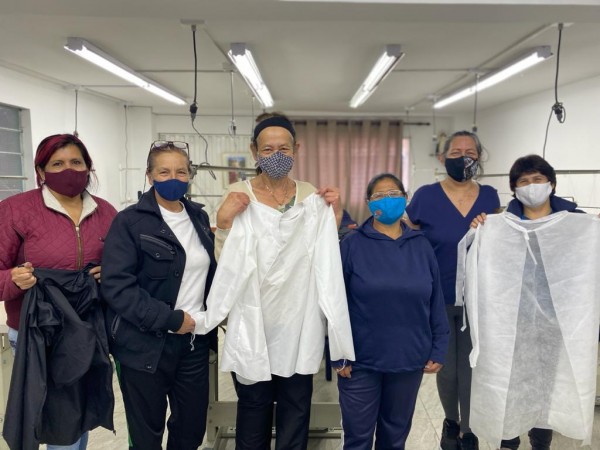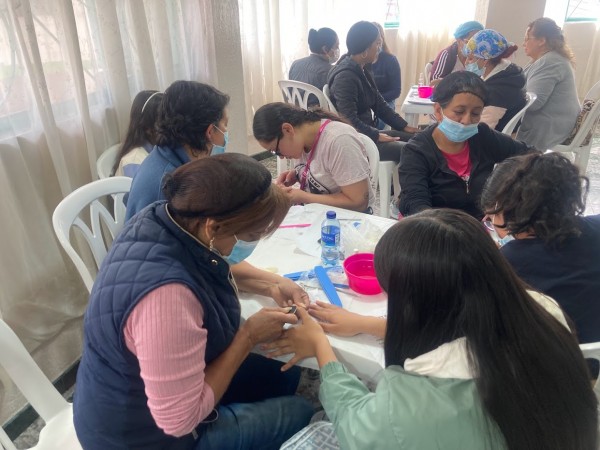
The various training courses that take place at the “Casa Garavito Community Development Center” in Bogotá, Colombia (sewing workshop, after-school tutoring, English, drawing and guitar classes), completely occupy the available space in this center. For this reason, in August we decided to rent an additional space, located in a building near the original headquarters of Casa Garavito, in order to expand our educational offer.
To begin with, we announced that we would start a manicure course for people interested in learning everything related to nail care, and 54 women signed up. This good response tells us that this is a field that interests many people. The idea, of course, is that once they finish the course, the students can earn some resources by offering nail care at home, or in shops dedicated to this.
The manicure classes in the new space (which we have called “Casa Garavito – Site B”) began the first week of September, with a teacher very dedicated to her work. So far, the students are happy and grateful for everything they are learning. We are convinced that to give training opportunities to people, who later can get a job thanks to this training, continues to be the best way to help the development of these marginal sectors from the South of Bogotá.
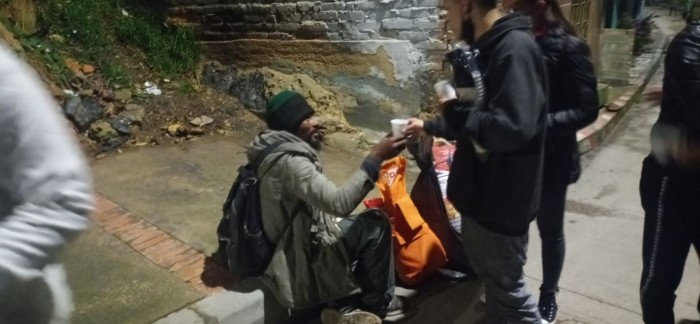
Six or seven months ago we started a new project in La Resurrección parish in Bogotá: on the last Thursday of each month we prepare some sixty sandwiches, fill several thermoses with aguapanela (hot water sweetened with panela from sugar cane) and with a group of volunteers we go out at night to walk around the neighborhood. As we meet street dwellers and homeless people who are spending the night outdoors, we offer them a hot glass of aguapanela and a sandwich—and then we talk with them for a while. Most of the men and women we encounter are drug addicts who have fallen into the consumption of psychoactive substances, which is one of the reasons why they have ended up living on the streets. We call this initiative “la Ruta del Aguapanela”, the aguapanela route.
Our task is simply to meet the homeless, offer them the minimum consolation of a little food and, over time, perhaps in some cases where the friendship created allows for it, propose a rehabilitation itinerary for those who ask for it.
Most of the volunteers who participate in this activity are adolescents and young people from the parish, and there is no doubt that this initiative also has an educational and pedagogical component for them: they become aware of the reality of their neighborhoods, and they can see firsthand the devastating effects drugs have on those who fall under their spell.
Every first Thursday, when we finish the Route, we are tired: it has been two or three hours of going up and down the steep streets of these neighborhoods located in the hills in the South of Bogotá, carrying bags with food and thermos, and it is cold, and sometimes it rains. However, each month, when we finish “la Ruta”, the atmosphere among those of us who have shared the experience is fraternal and joyful: no one complains. On the contrary, there is a sincere satisfaction for having invested a little of our time getting closer to the most marginalized, to people who are invisible to many—and having tried to be for them a presence of the mercy of God, even if is through a simple plastic glass with hot aguapanela.
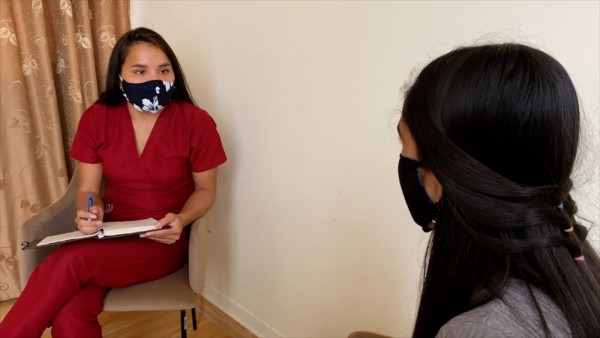
«Fr. Mike, can you come to the office? There’s a mother here with her daughter, saying she doesn’t know where else to go. She’s really upset,» read the message I received from the parish secretary.
I crossed the rectory to reach the office and found a woman sitting, clearly shaken, “I’m sorry Father, I didn’t know where else to go. Please help her! Tell her God loves her!” I asked her to breathe and to explain to me the situation.
Her 20-year-old daughter “Isabel” had been released the day before from the mental health hospital after having been there a month. She had been admitted after she had made several attempts on taking her life. She was prescribed a long list of strong medication. That same morning, they had gone to a clinic to make follow up appointments. She was able to make a short appointment with a counselor but would not be able to see a psychiatrist for at least three months.
Isabel didn’t want to be released from the hospital in the first place, and now her fears had been confirmed: it would be just too hard to get by outside of the safety of the hospital. Whatever comments she had made to her mother and father (who was waiting with Isabel in the car), lead to them coming to the parish out of despair per a neighbor’s suggestion.
“Of course, yes, I’ll speak with her, if she’d like to talk to me,” I replied. I then explained that in fact we, as a parish (through the CSP) offer free psychological services. “Sharoll, one of the psychologists, is here today. I think it would be good for Isabel to talk to her, too.”
It turned out that the mother had no idea that we offered psychological services. And when I said that considering the circumstances, Isabel could see Sharoll when she finished with her current appointment, the mother’s tone changed to something between shock and relief. “I can’t believe it. This must be God’s will. I never imagined that she’d be able to talk to a priest and a psychologist!”
We agreed that Isabel would come in to speak with me until Sharoll was available. Her mother brought her in, and it was instantly clear that Isabel was not well. She was wrapped up more than was necessary for the afternoon chill. Between her hoodie and facemask, I could just make out her exhausted eyes as they refused to look up. She would only speak with me if she her mother came, too.
As we sat down, Isabel made clear that it was her mother’s idea to speak with me. She personally figured it was too late. Perhaps it was this sense of nothing to lose that made her willing to be so open right away. She explained that she wasn’t comfortable being alone with men because she had been abused at age four (her parents found out years after it had happened). She described herself as having been “normal,” and having had friends, being happy, and even having started college. But the pandemic led to her being alone so much, and she began to remember things from her past, and felt that the “darkness” was just too heavy. “I’ve tried to get out from it, but it’s no use. I’m done. I just feel bad about how upset I am making my parents, and how sad it will make them…” With incredible strength, Isabel’s mother let her daughter speak.
Sharoll finished with her appointment and came to get Isabel. I spent some more time speaking with her mother, and then she went outside to wait with her husband for their daughter.
When I think of Isabel´s mother reaching out in despair for help, for some sign of hope, it recalls for me the woman with the “hemorrhage” in the synoptic Gospels. She had been sick and suffering for twelve years: Luke describes her had not been able to be healed by “anyone,” (Lk 8:43). Mark makes it sound even worse, saying she “suffered much under many physicians,” leaving her broke and worse off than before (Mk 5:26). She is often even depicted on the ground, desperately reaching out to touch Jesus´ garment. Similarly, Isabel´s mother may have thought: If I only can get her to the church, she will be made well.
After beginning the counseling program, we have become more aware of the despair that many people face with regards to their own mental health, or that of a loved one. Like in many parts of the world, access to mental health care Bogotá it is extremely limited, especially for our low-income families. Even those who have access, it can be a challenge: Esteban, a young adult who regularly sees Sharoll, explained to me that he had to wait for months between appointments, and they would be for 15 minutes each and not with the same counselor. The three month wait for somone like Isabel to see the psychiatrist is typical, even as a patient recently released from the psychiatric hospital.
This is precisely why we, as the Community of Saint Paul, began offering these services in 2020, and the expanded them at the beginning of 2021. For the majority it is the first time they are able to seek and receive mental health support. Like the woman in the Gospels, and Isabel and her mother, they reach out and find hope.
You may be wondering about Isabel. I’m happy to say she looks nothing like what she did those months ago. As Sharoll says “it’s day and night.” Their regular sessions together helped Isabel get by until she was finally able to see the psychiatrist, and a psychologist through the public system whom she is now able to see with some regularity. Isabel is now so well that she only sees Sharoll to stop by and say hello, and chat about her love of animals and going back to school.
If you’d like to know more details about our counseling program, you can see our video at:
https://www.youtube.com/watch?v=3m2t1-M-28s
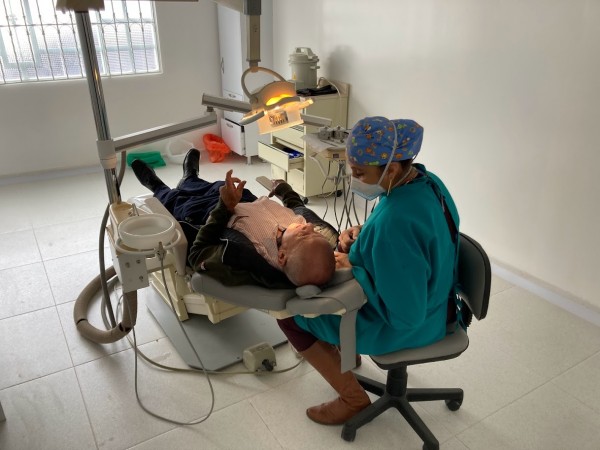
On October 12, after several months of preparations, we opened a dental clinic in the El Pesebre neighborhood of Bogotá. This is a new initiative of the Community of Saint Paul in Colombia, which wants to offer dental services at low cost to the people of the La Resurrección, Granjas de San Pablo and El Pesebre neighborhoods, where we work within the territory of La Resurrección parish.
The new dental clinic joins other initiatives that we have already been carrying out in the field of healthcare: the work of a nurse who does home visits to sick people, and that of two psychologists who offer psychological support several days a week.
For now, the practice will open on Tuesdays and Thursdays. The dentist we have hired is a person with many years of experience in the field, who also understands the service vocation of this particular clinic.
The population of our neighborhoods (in which until now there was only a small private dental clinic) has welcomed this new initiative with great joy and gratitude. We hope that the clinic will become another sign of the Church's work in these vulnerable sectors of Bogotá, aimed at dignifying the lives of its inhabitants.
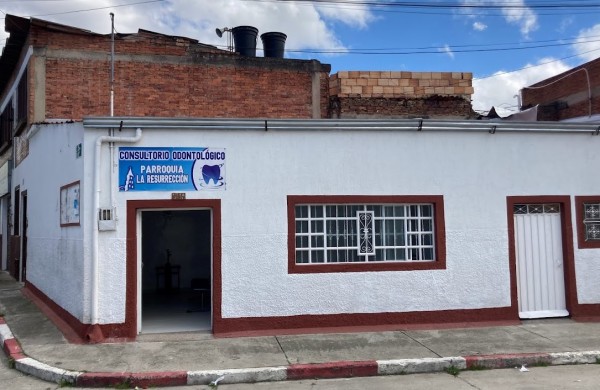
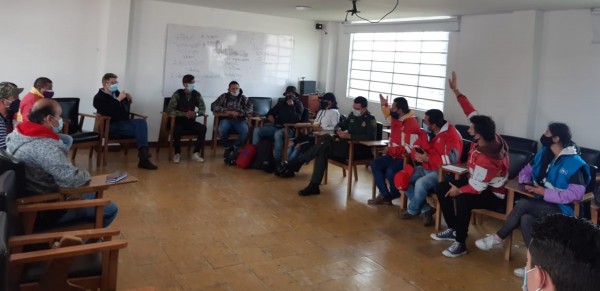
A few weeks ago, the members of the Community of Saint Paul who live and work in Bogotá were involved in a complicated situation that, fortunately, was resolved in a satisfactory way—and it left us with several lessons.
It was Thursday. At noon, a hundred young people from “Primera Línea” (an anti-government protest movement) appeared in La Resurrección neighborhood, where we live. For several months now, members of “Primera Línea” have led numerous marches against various measures of the government on the streets of Bogotá and other cities in the country. They also ask for a change in the Colombian political system.
A neighbor had offered them a vacant lot (located one block away from the parish) so that they could camp there, since they were being evicted from all the places where they had attempted to stay, in other parts of the city. The protesters arrived with several injured men (who had been wounded in their clashes with the police). Some injuries were quite serious. Then, what was predictable happened: the residents of the street where the newcomers wanted to stay did not like the idea, and the tensions, the insults, the attempts of violence began. The media have been reporting the vandalism that has sometimes accompanied the marches, and this caused some neighbors to strongly oppose the idea of sheltering protesters in their neighborhood.
We, upon hearing what was occurring, went to the place and offered a parish hall to attend to the wounded. Then we agreed to initiate a dialogue between neighbors and protesters to appease spirits and prevent all violence. We suggested that the dialogue could take place in the parish. We, as a neutral party, would act as moderators and guarantors of the dialogue. We ended up sitting around a table from three in the afternoon until after eight at night: leaders from “Primera Línea”, neighbors, staff from the mayor's office, which now had also arrived, police officers, representatives of Human Rights organizations ...
It was an exercise in patience and listening, aimed at reaching a satisfactory agreement for all. When the tension rose, and the dialogue seemed to be about to collapse, we would propose to take a break and serve snacks, and the young people from “Primera Línea” said that it was the first time they had a cup of coffee with the police (for that, everyone had to remove their hoods and masks, showing their faces). By seven in the evening the situation seemed to have stalled. The mayor of Rafael Uribe Uribe section had arrived (Rafael Uribe Uribe is the section of Bogotá where La Resurrección is located) and reported that there was nothing to discuss: the people from the protest had to leave without further delay. Otherwise, they would be forcibly evicted by the police. They were asking to stay camped for one night in the green space next to the parish, to rest and stay close to their wounded, and they promised to leave the next day. The mayor was unyielding: she had strict orders not to offer them any public property —and the land where they wanted to spend the night is public space: they could not stay. And the policemen said that they were against exercising violence, but that, if they received orders to vacate the area, they would do so using whatever means were necessary. While the dialogue seemed to be going nowhere, reports were reaching us from the street that the situation there was becoming more tense, and it threatened to spin out of control. Someone was walking the neighborhood with a loudspeaker, calling on neighbors to get out of their houses and organize a mob to drive out the intruders. And we also began to receive word that false news was running through the neighborhood and through social media, which compromised us: apparently, some people were saying that we had offered the parish church for the protesters to spend the night (not true), and that we were negotiating for them to stay six stay months in the neighborhood (false as well)…
Suddenly, the mayor said that she had just received a communication on her phone according to which the vacant lot next to the church was not a public space: it belonged to the local Neighbors’ Association. In light of this new information, the president of the Neighbors’ Association said that they would allow the young people to stay there for one night. A solution had been reached. They asked us, as representatives of the Church, to go out and inform the neighbors and the protesters of the agreement reached. We immediately set up a sound system in the square in front of the parish, we went out, and under the rain of the night, we explained the agreement reached, and the neighbors went back to their homes.
The night was calm, without altercations. The next morning the protesters kept their word and left, after sleeping in their makeshift tents under a persistent rain that did not stop falling until dawn. They left the area very clean, without a single piece of garbage.
It was an experience that, despite its unexpected nature and the fact that at times it was distressing, allowed us to experience first-hand the role of mediation that the Church can play in situations of social conflict, working so that opposing parties listen to each other, dialogue, try to understand the other position and, leaving aside emotions and prejudices, achieve what is most important: to avoid violence.
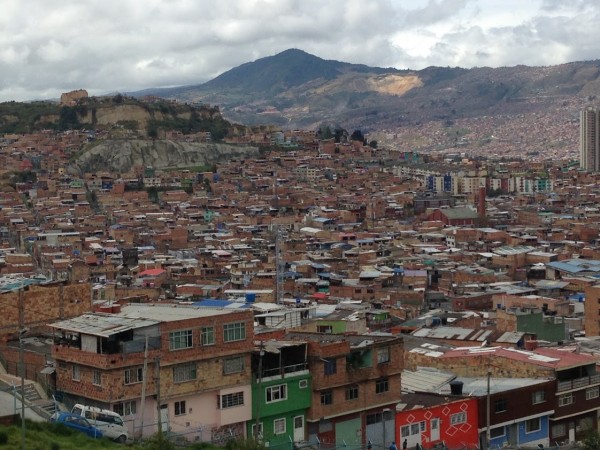
I currently live and work with Fr. Martí Colom (fellow member of the CSP and pastor) in La Resurrección Parish in Bogotá, Colombia. The parish covers three “working-poor” neighborhoods in the south of the capital city. Of the six socio-economic strata that Bogotá is separated into, our area is Stratus 2, “Low.”[1]
When I first arrived in October of last year, Martí told me that many of the parishioners had been hit hard financially by the pandemic, and that it was hard to see so many new people coming to ask for help with food who had never done so before.
Martí’s observation was recently confirmed by data published by the Colombian government. The National Administrative Department of Statistics (henceforth “DANE” for its name in Spanish) published a striking, and distressing, report on the growth of poverty in the country during 2020.[2] It focuses on what it calls “Monetary Poverty,” based on household income. While this is only one metric, that data does serve to show how to show how the dire situation regarding poverty in Bogotá was made much, much worse during the first year of the COVID-19 pandemic, especially regarding those who went from “poor” to “extremely poor.”
The basic measure establishing the lines of poverty and extreme poverty are calculated with monetary values using the household income, per capita, and the cost of a “basic basket of food.”[3] The definition for the line of extreme poverty is focused on the estimation of the cost for maintaining a basic daily caloric intake of 2100 calories per person. And the value set for the line of poverty includes the estimation of some other basic needs and services. Both values are adjusted for the cost of living in the different areas of the country.
For the country as a whole, the DANE Poverty Report calculated the poverty line at about $90 USD, per person, per month.[4] It is important to remember that this is per capita, meaning that it is the sum of the total income of a household, divided by the number of persons living there. For example, in a household of five where both parents work and each make $200 per month, totaling $400, the per capita income of the home is $80 and therefore that household falls below the poverty line. Because of the higher cost of living in the capital city, the amount for the poverty line was set in Bogotá at $123 USD per person, which is just over $492 USD for a family of four, per month.[5]
The DANE Report defines extreme poverty those living in Bogotá at $48 USD per person, or $192 USD for a family of four, per month.[6] For context, the legal minimum wage set by the government in 2020 was $237 per month.[7] That means that in a household of two persons in Bogotá, with one working and making a minimum wage, that family already falls under the poverty line. And in the case of a household of five, with one person making minimum wage, they are considered extremely poor.
Knowing how the lines are defined by DANE, let us now look at how many more people were identified as poor and extremely poor by the government in 2020, compared to 2019.
Comparing 2020 to 2019, per the April DANE report on poverty, there was an increase of 6.8% more of the population under the poverty line (up to 42.5% from 35.7%). Regarding extreme poverty, 5.5% more of the population fell below the line (15.1% from 9.6%). That means that nationally, comparing 2020 to 2019, there were 3.5 million MORE people who fell beneath of poverty line, and 2.8 million MORE who entered into extreme poverty. Per these numbers, in 2020 over 21 million people in Colombia were defined as poor, and of these, over 7.5 million were extremely poor, meaning they have just enough to eat.
Of the increase in the number of the country’s poor in 2020, almost one third was in Bogotá (31.3%). According to DANE there were 2,246,851 persons living under the poverty line in Bogotá in 2019, and in 2020 there was an increase of 1,110,734 more. That represents an increase of 49.4% in just one year! Population growth in the city cannot account for such a large increase.
It is more dramatic when we look at the population that falls under the line for extreme poverty. Keep in mind, this is defined for Bogotá as those living off of $48 USD or less per person, per month. According to DANE, in 2019 there were 344,591 persons in Bogotá living in extreme poverty. In 2020, there were 1,108,836. That is an increase of 764,245 more persons, or 222%! Using the estimated 2020 population of the city of 10,978,000, this means that over 10% of the people living in Bogotá that are defined as extremely poor.[8]
Much of the increase in those identified as extremely poor are surely (but not necessarily), those who have gone from “poor” to “extremely poor.” The DANE report identifies anecdotal evidence of many households that went from having limited income, to no income as all. This is representative of many of the families in La Resurrección Parish. They were “poor” before but are now struggling to have enough to eat.
In fact, if we compare the increase of those considered extremely poor in Bogotá to the nation as a whole, we see that Bogotanos have been particularly hit hard by the pandemic. Bogotá accounts for 27.5% of the increase in those considered extremely in the country. But what is particularly telling is to see how the increase in Bogotá compares to increase in the country. Nationwide, the total number of those considered extremely poor increased by 59.3%, a data point that is mind-boggling and heart-breaking. However, when compared to the 222% increase of those considered extremely poor in Bogotá, it shows that the lower-level income families of the capital city have been affected especially hard by the economic fallout of the pandemic.
Overall, this increase in poverty has led to an increase in inequality within Colombia. One of the measures of inequality within a population is to also look at income. The international standard used for this is an index referred to as the Gini coefficient. A Gini coefficient of 0% represents the hypothetical, perfect income equality within a population. Anything above that represents how far off a population is from this income equality. DANE reports that the Gini coefficient for Colombia was 54.4% in 2020, a significant one year jump up from 52.6%.[9] This possibly puts it at likely the highest in Latin America and is certainly one of the highest in the world.[10] For context, we can compare it to the World Bank estimates for the USA in 2018 with a coefficient of 41.4%, the Dominican Republic in 2019 with a coefficient of 41.9% or Spain with 34.7% in 2018.
In sum, the official data from the Colombian government confirms what we have seen and heard from our parishioners regarding their economic struggles as a result of the pandemic, especially in Bogotá. It also gives some background to the current situation of a country, that has now had two weeks of protests, demanding a vast array of reforms. Some of these numbers in the DANE report are men, women and children that we know by name. They are families who come to our door to ask for food, and who offer intentions in our Masses for dignified employment. Through the parish and the CSP programs, we do what we can to help and to provide a spirit of hope in these trying times. And we join our parishioners in their prayers for employment and more opportunities to break the cycles of poverty. While Colombia surely has a long road ahead for economic recovery, may it be the path towards a more just and peaceful future.
[1] colombia.as.com. The government uses the terms "estratos socioeconómicos", and the terms used are for 1 -bajo bajo, 2 – bajo and 6 – alto.
[2] DANE. 29 abril de 2021. Pobreza Monetaria en Colombia: Resultados 2020. https://www.dane.gov.co/files/investigaciones/condiciones_vida/pobreza/2020/Presentacion-pobreza-monetaria_2020.pdf. See also the Comunidado de prensa on the same report, published April 29, 2021. https://www.dane.gov.co/files/investigaciones/condiciones_vida/pobreza/2020/Comunicado-pobreza-monetaria_2020.pdf. Last accessed 11 May 2021.
[3] The concept of “basic basket of food” to sustain a family is a measure commonly used, including in the USA. This means of defining the poverty line comes from the United Nations Economic Commission for Latin America and the Caribbean (CEPAL, in the Spanish).
[4] $331,688 Colombian pesos (COP) per capita. I use here in this analysis a rough average exchange rate during the 2020 year of 3,700 COP to 1 USD.
[5] $455,030 COP per month, per person.
[6] $178,607 COP, per person.
[7]$877,803 COP. I do not include the extra amount required for the travel costs of the employee, if applicable, because the presumption is that that amount is spent in transportation by the employee to and from work. In fact, oftentimes, the cost is significantly more. From Decreto No. 2360 del 2019.
[8] There is another 20% of the city is that is “poor”, with a total of almost 31% of its population that falls under the poverty line.
[9] According to the World Bank, in terms of the Gini coefficient, Colombia had a high of 58.7% in 2000 and low of 49.7% in 2017. The World Bank also put the 2019 in Colombia at 51.3%, which would mean an even higher jump from 2020.
[10] Using the most recent data from the World Bank, which would not show the effects of the pandemic. https://data.worldbank.org/indicator/SI.POV.GINI. Last accessed 11 May 2021.
Recently, women who learned how to sew with industrial machines at CSP's Casa Garavito Community Development Center in Bogotá have obtained new contract, in this case with a Healthcare Company. Each week they must produce 250 disposable gowns for the staff of this health company, for the agents who conduct Covid tests in the Colombian capital. In the midst of the innumerable difficulties and suffering that the pandemic is causing to so many people, this contract is a relief for the women of our center and for their families, as well as a very concrete way of collaborating in the fight against the coronavirus. We explain it in the following video.
https://www.youtube.com/watch?v=jsh5hmq-8TA&feature=youtu.be
The Community of Saint Paul expands its programs in Bogotá (Colombia) with the services of a psychologist
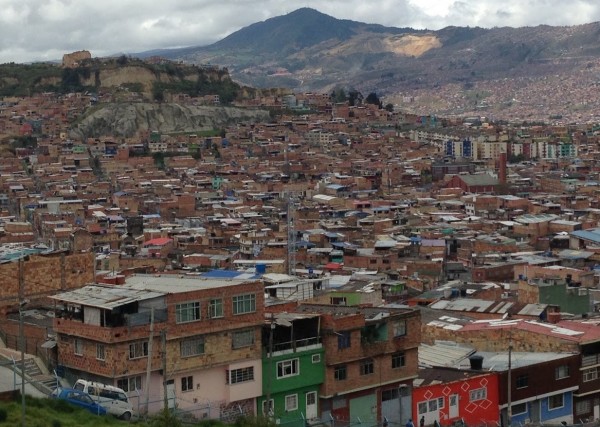
Since the beginning of July, the “Casa Garavito Development Center” of the Community of Saint Paul in El Pesebre neighborhood of Bogotá, has the help of a psychologist who, once a week, on Tuesdays, attends to people who need her assistance.
This new program has been very well received by the residents of El Pesebre and Granjas de San Pablo (the neighborhood adjacent to El Pesebre). In fact, a few days after announcing to the community that the psychologist would begin her work, the appointment schedule with adults, young people, children and families which showed interest in seeing her had already been filled.
For most people in these low-income neighborhoods it is not easy to obtain psychological assistance, due to its high costs and the poor health system in the country. Consequently, it is great news to have right here in the area a professional who attends those who ask for it for free, offering her listening skills, guidance and support.
With the beginning of the school year, the various educational programs of the Community of Saint Paul in Casa Garavito Community Development Center in Bogotá (Colombia) have begun
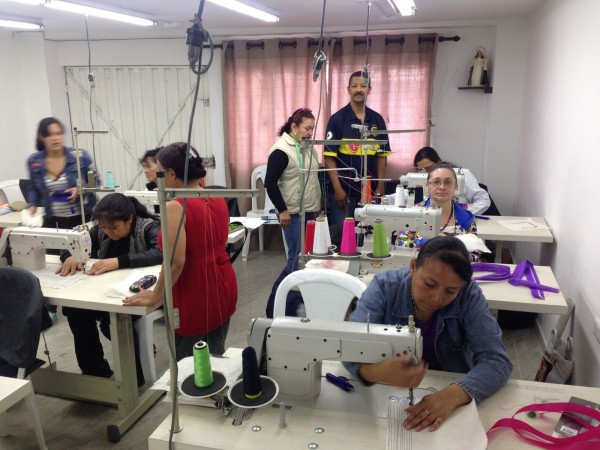
In Colombia, the school calendar runs from February to November, so that students' longer vacations, which in other countries are in July and August, take place in December and January. With the start of the academic year in the schools and universities throughout the country, we have also started the various educational programs that operate in the Casa Garavito Community Development Center, which the Community of Saint Paul runs in the El Pesebre neighborhood in Bogota.
This year we have launched two groups of new students for the Sewing classes. Adding the people who have registered to start from scratch to those who will continue their training from last year, there are now 50 people (mostly women, although also some men accompany them) in these courses.
Another program that also started the first Saturday of February was the education for the group of elderly who have been receiving academic formation since 2017. We are very happy to report that this year several new students have joined this group. Today around twenty older adults meet, pen and paper in hand, every Saturday at “Casa Garavito” for their classes.
The guitar lessons for children and young people have started as well. Additionally, we are now enrolling children and teenagers to take Basic English classes, a new initiative which will begin in April. This will undoubtedly be a good complement to the rest of the programs, and many people have already shown interest in it.
From “Casa Garavito” (where other pastoral programs take place, such as a weekly Bible workshop and a youth group) we continue to coordinate our university scholarship program. In 2019 we will be assisting 22 students from the neighborhood so that they may continue their university studies.
Finally, a new initiative of the Community of Saint Paul in Bogota for this 2019 is that we have started a collaboration with a local foundation (“Solidarity, Strength of the Little Ones”) that for some years has served people with mental disabilities. Thanks to the CSP’s involvement, the men and women cared for the foundation have now activities organized for them three days a week (before, they were only gathering once a week).
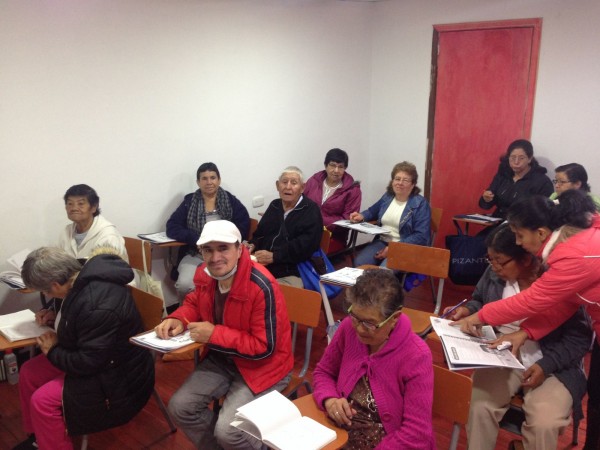
Students of the sewing course of the Community of Saint Paul in Bogotá organize an exhibition with garments made by them
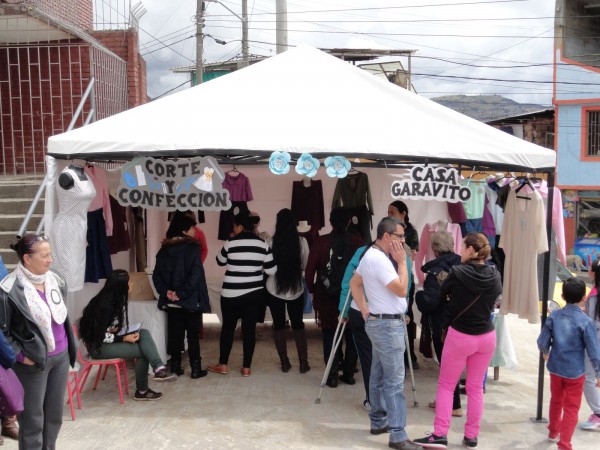
On August 5, the first exhibition of garments made by the women of the Sewing workshop that the Community of Saint Paul established a year ago in the south of Bogotá (Colombia), took place at La Resurrección parish. The exhibition was a very positive experience, both for the women who are part of the project, who were able to make their work known to others, and for the parish community, who had the opportunity to appreciate the fruits of the workshop. Several people, seeing the good quality of the exposed clothes, ordered women's dresses, blouses and jackets.
This exhibition has been carried out thanks to the perseverance and commitment of the group of women who, after a year of training, now arrive at the end of the first stage of the process. And they are already very excited about the next stage: establishing a productive cooperative through which the learning they have received can result in direct benefits for the families of these women. To all the participants in our sewing center, we want to say: congratulations, and let’s keep going!
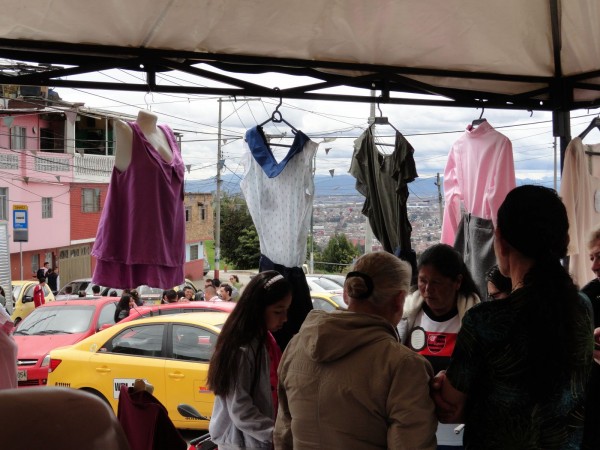
Thirty children and teenagers sign up for the music classes that the CSP has started in the Pesebre neighborhood of Bogotá
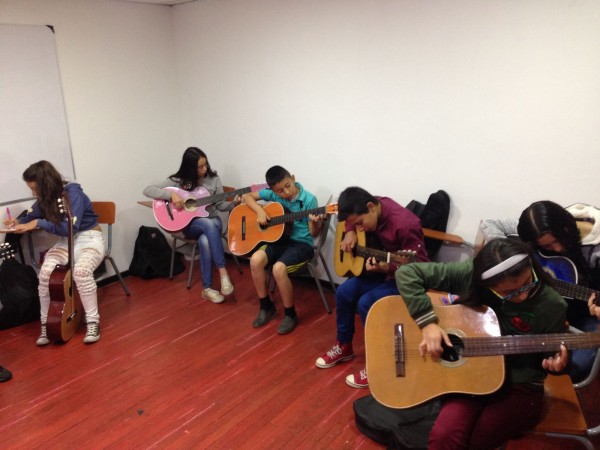
The Community Development Center "Casa Garavito", which we inaugurated last April in El Pesebre neighborhood of Bogotá, is already working at a good pace. The last initiative that we started in the center's facilities (besides the sewing courses for women, training classes for the elderly, library, meetings of a youth group and a weekly Bible workshop) has been a guitar course for children and young people from the area.
We announced this new activity in the neighborhood and in a few days thirty children and teenagers were enrolled. We divided them into two groups, and the classes have been going very smoothly every Saturday since mid-June. For now, the future guitarists are enthusiastic about what they are learning, and Manuel, the instructor, assures us that the students are joyful and talented.
There is no doubt that music is very attractive to many people, perhaps especially among to the youth. In that sense, we are very happy to offer a service like this in a neighborhood where the opportunities to learn how to play an instrument are very scarce.
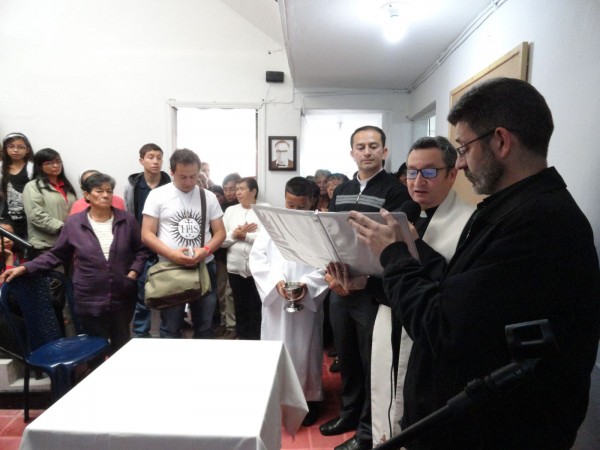
On April 15 took place the inauguration and blessing of the new Community Development Center that the Community of Saint Paul has established in the El Pesebre neighborhood of Bogotá (Colombia).
This Community Development Center has been baptized as “Casa Garavito”, in memory of Fr. Alfonso Garavito Rodríguez, a priest from Bogotá who from the mid-60s to his death in 2006 exercised his ministry, with exemplary dedication, in the southern side of the Colombian capital. For a time, he even resided in the house that, now, the CSP has rented and arranged to be used for pastoral purposes.
In the premises of the Center, the Sewing Workshop established by the CSP has already been in operation for several weeks. Thirty women are currently being trained there. Soon, we will also transfer there the classes we offer to a group of older adults in the neighborhood, as well as a small library, school reinforcement classes and catechesis for children and young people.
For the blessing of the Center we had the presence of Msgr. Alberto Forero Castro, Vicar of the Pastoral Region of Bogotá in whose territory is located the Pesebre neighborhood. A good number of neighbors and members of the local community also participated in the celebration.
It is our wish that the new Community Development Center “Casa Garavito” may contribute to the wellbeing of the section of Bogotá where it is located, becoming a place where many people may be trained to face, with the right tools, the many challenges that life poses to them.
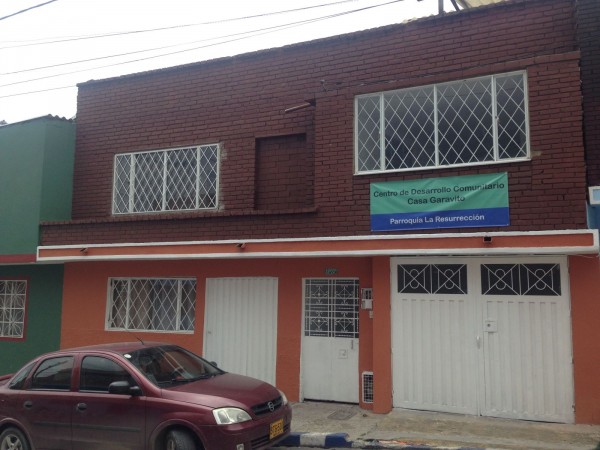
The Community of Saint Paul has established a Sewing Center in the neighborhood called Granjas de San Pablo in Bogotá, Colombia
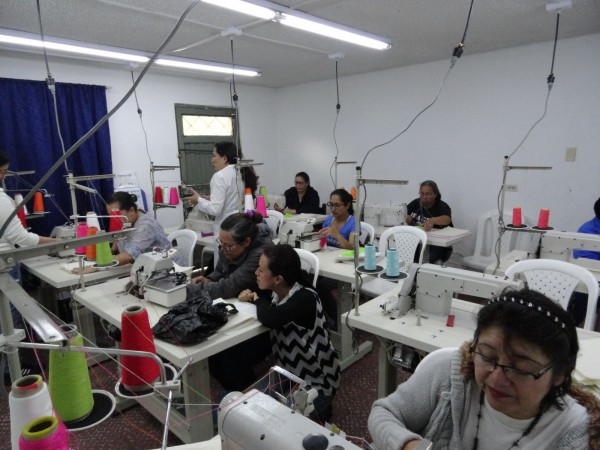
As an extension of the pastoral work and the development projects that the CSP is developing in the south of Bogotá, we have started a new program: the establishment of a training workshop for women, in which they are offered sewing classes.
After several meetings with women from the neighborhood who were interested in being able to receive formation in some field, so that in the future they could be able to help sustain their families, we decided that sewing was the best option. Once this decision was made, we started looking for the person who could give the courses, and we were fortunate to find an instructor who has been teaching dressmaking courses in different institutions in Bogotá for more than twenty years, and who was willing to offer her services. Then we acquired nine industrial sewing machines and we proceeded to establish the workshop in the premises of a neighborhood association in Granjas de San Pablo.
The first group of students is made up of 16 women. They registered with the goal of completing two semesters of training. Classes take place three days a week in the afternoon hours. When they finish the second semester, the CSP will help the participants that wish to organize themselves as a small company to producing clothing (blouses, skirts, underwear, sportswear ...). Then, using the same machines as the project, they will be able to start to market their products and thus help their families.
It is great to see the enthusiasm with which the students have welcomed this project, and also the atmosphere of camaraderie and solidarity that has been created between them. In February 2018, when the new school year begins in Colombia, we will start with a new group of students, while the first ones continue with their second semester of training.
From here we would like to thank all the institutions and people who with their contributions have helped us to establish this training center, and help us to maintain it.
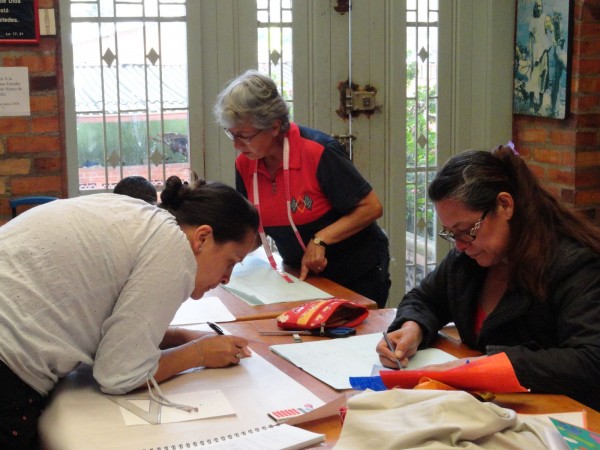

In the Community of Saint Paul, we firmly believe that access to quality education, from early childhood until college, is the indispensable key to the authentic and long-term development of people and communities. Without good formation, it will be very difficult for the most vulnerable sectors of society to move out of poverty. Only education will provide these sectors with the tools they need to positively work on their own development. That is why, for a long time now, in most places where we work, we think about what we can do to guarantee the access of low-income people to a quality academic education.
In this vein, we recently started a scholarship program for university students in Bogotá. As we have repeatedly reported on this blog, since January 2016 CSP members are working in the neighborhoods of La Resurrección, Granjas de San Pablo and El Pesebre, in the south of the Colombian capital. Since then, we have met many young people from these neighborhoods who, once they finish high school, want to go to college, but because of a lack of resources they cannot fulfill their yearning. In order to respond to this need, we have established a scholarship program, though which we are already collaborating with a dozen young people in the first semester (from August to December 2017), facilitating, with small scholarships of support, that they may go to college. Most have enrolled in one of Bogota's several Colombian public universities, whose costs are naturally lower than in private universities. The CSP scholarship consists of paying for its semester enrollment and monthly expenses for transportation and materials.
At the moment, it is a very modest initiative that we hope it can grow with time. So far, we are delighted with the enthusiasm with which each of the students who have approached us has taken up the challenge of going to university, well aware that this is the best way for their personal development, and that of their community.
The CSP begins a new program for senior citizens in El Pesebre neighborhood of the Colombian capital
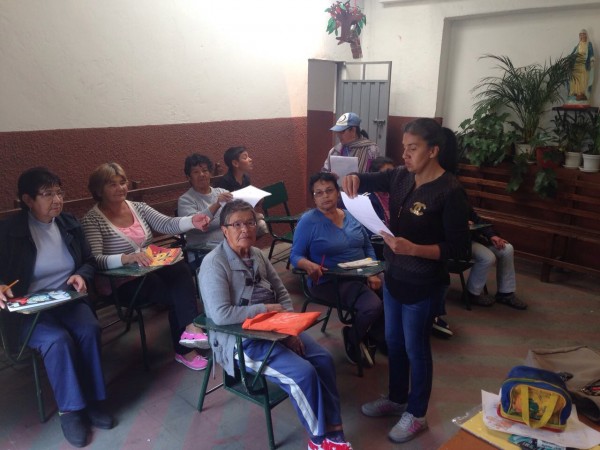
Last August we informed in this blog that the Community of St. Paul had started an after-school program for children in El Pesebre neighborhood in Bogotá. This program has a double goal: first, to help academically children aged 8 to 12 who need assistance with their studies; secondly, to offer them a safe environment where they can go in the afternoons and thus avoid that, by being on the street, they may fall into consumption of drugs. The project has been functioning with normality since its beginning. What we never expected was that such a program would be the trigger for another one: seeing that the parish facilities of the neighborhood opened several afternoons a week for the children, a few senior citizens came to us with a simple petition: «Can you teach us as well?»
It turns out that several grandparents in the district, who were born in rural provinces of the country and moved to Bogotá many decades ago, have had a long life of hard work and have never had the time to care for their intellectual formation. Some are illiterate, others know how to read and write, but barely, and do not have many knowledge of mathematics, history, geography…
We searched for a teacher from the same area willing to take on this task, and at the beginning of March we opened our new Educational Program for the Elderly. It operates every Saturday morning, and a dozen of grandmothers (they seem to be more interested than the men!) and one grandfather are already enrolled. They do not miss one class, are very attentive (in fact, they take their studies very seriously). For us it is a real joy to see them week after week, sitting in their desks and learning so many things that when they were children never had the opportunity to study.
The Community of Saint Paul starts an after school program in Pesebre, a neighborhood in the south of Bogotá
Since last January, members of the CSP have worked in La Resurrección Parish, located in the southern part of Bogotá. The parish territory includes La Resurrección, Granjas de San Pablo and Pesebre neighborhoods: these are humble, working-class areas of the Colombian capital, mostly layer 2 on the socioeconomic classification of the City of Bogota (which lists the neighborhoods of the capital from 1 to 6, with 1 being the areas with least resources and 6 the wealthiest).
These sectors face a remarkable variety of challenges, from the overcrowding of people in homes of poor quality to the difficulties of families in obtaining quality health services; from the few job opportunities for young people to the abandonment of many elderly. However, after listening in various meetings to the population of these neighborhoods, we soon found that one problem concerns them more than any other: the insecurity prevailing in the streets, directly related to the consumption of narcotic substances by many young people, who commit crimes to obtain resources to be able to use drugs. Drug dependence, in turn linked to the lack of opportunities that many young people face, is a real epidemic in these neighborhoods, where everyone recognizes the existence of several "ollas"—literally, “cooking pots”, that is, spots where drugs are sold in the streets of the capital by the nets of trafficking.
Many people have told us about a dramatic new concern: increased drug use among children of progressively younger ages. If a few years ago those who fell into drug dependence were generally kids older than sixteen or seventeen, the need of the drug dealers to expand the sale of their substances has now made it common that children aged nine, ten and eleven may start using them.
While recognizing the magnitude of the problem, and that all our efforts will just be a drop of water in a great ocean, we considered what to do to help, even in a modest way, to curb this trend. We decided to offer tutoring classes in the evenings, on the premises of the parish in the Pesebre neighborhood. We started in late July: fifteen children between 8 and 12 years were enrolled on the first day, and we hope that this service will keep growing. Part of the problem is that many children who go to school in the morning are by themselves when they come home at two or three in the afternoon, since their parents are away at work, many until late into the night. These children then have no one to help them do their homework or to prevent them from leaving and wandering the streets until dusk, which obviously makes it easier for them to end up falling into the networks of consumption. Our proposal is very simple: to provide a space where these children can go after school, and where they will be helped to advance in their studies, with tutoring and room assignments, and thus perhaps prevent drug dependence from taking over their lives. We have just started. We hope that this becomes a long-term project that may bear some fruit!








